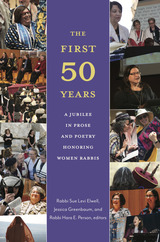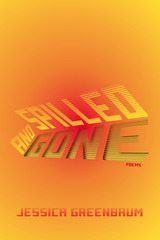4 books by Greenbaum, Jessica

The First Fifty Years
A Jubilee in Prose and Poetry Honoring Women Rabbis
Rabbi Sue Levi Elwell, Jessica Greenbaum, Rabbi Hara E. Person
Central Conference of American Rabbis, 2023
The ordination of Rabbi Sally J. Priesand in 1972 was a watershed moment in Jewish history. In The First Fifty Years, contributors from across the Jewish and gender
spectrums reflect on the meaning of this moment and the ensuing decades, both personally and for the Jewish community. In short pieces of new prose, authors—
many of them pioneering rabbis—share stories, insights, analysis, and celebrations of women in the rabbinate. These are intertwined with a wealth of poetry that
poignantly captures the spirit of this anniversary. The volume is a deep, heartfelt tribute to women rabbis and their indelible impact on all of us.
spectrums reflect on the meaning of this moment and the ensuing decades, both personally and for the Jewish community. In short pieces of new prose, authors—
many of them pioneering rabbis—share stories, insights, analysis, and celebrations of women in the rabbinate. These are intertwined with a wealth of poetry that
poignantly captures the spirit of this anniversary. The volume is a deep, heartfelt tribute to women rabbis and their indelible impact on all of us.
[more]

Mishkan HaSeder - Visual T'filah - Basic
A Passover Haggadah
Hara Person
CCAR Presentations, 2022
Combining age-old texts, fresh insights, inspiring poetry, new translations, and breathtaking art, Mishkan HaSeder sets a new standard in Passover Haggadot. Using the beloved format of Mishkan T'filah and Mishkan HaNefesh, this Haggadah offers beautiful new translations by Rabbis Janet and Sheldon Marder in conversation with an extraordinary collection of poetry from a diverse array of poets. The running commentary by Rabbis Oren Hayon, Seth Limmer, and Amy Scheinerman draws out the historic background of the seder rituals, builds on the social justice issues of our day, and offers contemporary connections to Passover. The text is complemented by full-color works from acclaimed artist Tobi Kahn that will enhance any seder experience.
Mishkan HaSeder features poetry by Yehuda Amichai, Ellen Bass, Lucille Clifton, Edward Hirsch, Ross Gay, Emma Lazarus, Denise Levertov, Ada Limon, Grace Paley, Dan Pagis, Adrienne Rich, and many more. Equally suited to home and community celebrations, this is a Haggadah for today and tomorrow. Mishkan HaSeder has the depth to stimulate experienced seder leaders while its accessible explanations will make those joining our tables for the first time feel welcome.
Mishkan HaSeder features poetry by Yehuda Amichai, Ellen Bass, Lucille Clifton, Edward Hirsch, Ross Gay, Emma Lazarus, Denise Levertov, Ada Limon, Grace Paley, Dan Pagis, Adrienne Rich, and many more. Equally suited to home and community celebrations, this is a Haggadah for today and tomorrow. Mishkan HaSeder has the depth to stimulate experienced seder leaders while its accessible explanations will make those joining our tables for the first time feel welcome.
[more]

Mishkan HaSeder - Visual T'filah - Pro
A Passover Haggadah
Hara Person
CCAR Presentations, 2022
Combining age-old texts, fresh insights, inspiring poetry, new translations, and breathtaking art, Mishkan HaSeder sets a new standard in Passover Haggadot. Using the beloved format of Mishkan T'filah and Mishkan HaNefesh, this Haggadah offers beautiful new translations by Rabbis Janet and Sheldon Marder in conversation with an extraordinary collection of poetry from a diverse array of poets. The running commentary by Rabbis Oren Hayon, Seth Limmer, and Amy Scheinerman draws out the historic background of the seder rituals, builds on the social justice issues of our day, and offers contemporary connections to Passover. The text is complemented by full-color works from acclaimed artist Tobi Kahn that will enhance any seder experience.
Mishkan HaSeder features poetry by Yehuda Amichai, Ellen Bass, Lucille Clifton, Edward Hirsch, Ross Gay, Emma Lazarus, Denise Levertov, Ada Limon, Grace Paley, Dan Pagis, Adrienne Rich, and many more. Equally suited to home and community celebrations, this is a Haggadah for today and tomorrow. Mishkan HaSeder has the depth to stimulate experienced seder leaders while its accessible explanations will make those joining our tables for the first time feel welcome.
Mishkan HaSeder features poetry by Yehuda Amichai, Ellen Bass, Lucille Clifton, Edward Hirsch, Ross Gay, Emma Lazarus, Denise Levertov, Ada Limon, Grace Paley, Dan Pagis, Adrienne Rich, and many more. Equally suited to home and community celebrations, this is a Haggadah for today and tomorrow. Mishkan HaSeder has the depth to stimulate experienced seder leaders while its accessible explanations will make those joining our tables for the first time feel welcome.
[more]

Spilled and Gone
Poems
Jessica Greenbaum
University of Pittsburgh Press, 2019
Spilled and Gone, Jessica Greenbaum's third collection marries the world through metaphor so that a serrated knife on its back is as harmless as "the ocean on a shiny day," and two crossed daisies in Emily Dickinson's herbarium "might double as the logo /for a roving band of pacifists."
At heart, the poems themselves seek peace through close observation's associative power to reveal cohering relationships and meaning within the 21st century-and during its dark turn. In the everyday tally of "the good against the violence" the speaker asks, "why can't the line around the block on the free night/ at the museum stand for everything, why can't the shriek /of the girls in summer waves . . . / be the call and response of all people living on the earth?" A descendant of the New York school and the second wave, Greenbaum "spills" details that she simultaneously replaces-through the spiraling revelations only poems with an authentic life-force of humanism can nurture.
At heart, the poems themselves seek peace through close observation's associative power to reveal cohering relationships and meaning within the 21st century-and during its dark turn. In the everyday tally of "the good against the violence" the speaker asks, "why can't the line around the block on the free night/ at the museum stand for everything, why can't the shriek /of the girls in summer waves . . . / be the call and response of all people living on the earth?" A descendant of the New York school and the second wave, Greenbaum "spills" details that she simultaneously replaces-through the spiraling revelations only poems with an authentic life-force of humanism can nurture.
[more]
READERS
Browse our collection.
PUBLISHERS
See BiblioVault's publisher services.
STUDENT SERVICES
Files for college accessibility offices.
UChicago Accessibility Resources
home | accessibility | search | about | contact us
BiblioVault ® 2001 - 2024
The University of Chicago Press









